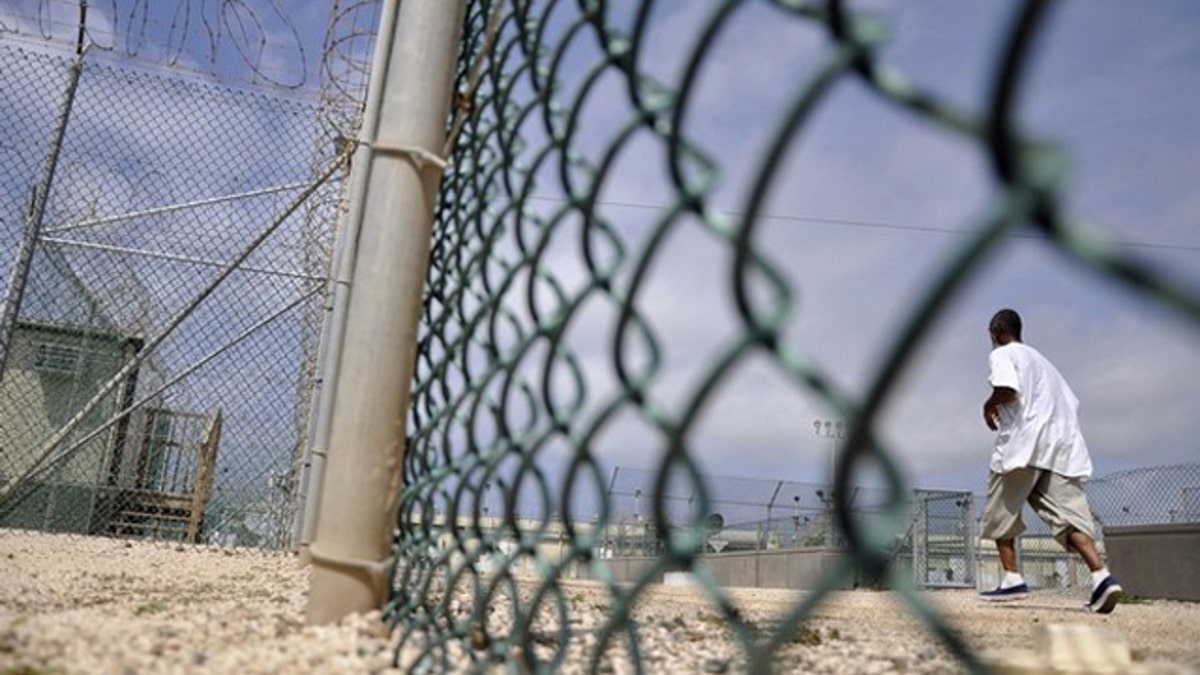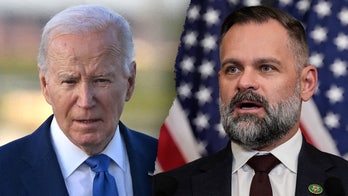
In this April 27, 2010 photo, a detainee runs inside an exercise area at the detention facility at Guantanamo Bay. (Reuters)
President Obama announced Monday that military trials will resume for detainees at the Guantanamo Bay prison camp, a move that won praise from Republicans, who say the president has finally "seen the light" on the value of trying such detainees at the facility.
Obama, saying he wants to "broaden our ability to bring terrorists to justice," issued an executive order outlining the changes Monday afternoon, as Defense Secretary Robert Gates rescinded a January 2009 ban against bringing new charges against terror suspects in the military commissions.
"I strongly believe that the American system of justice is a key part of our arsenal in the war against Al Qaeda and its affiliates, and we will continue to draw on all aspects of our justice system -- including Article III courts -- to ensure that our security and our values are strengthened," the president said in a written statement. Article III courts are civilian federal courts.
Rep. Peter King, the Republican chairman of the House Committee on Homeland Security, praised the move as "clearly another step in the right direction."
“The bottom line is that it affirms the Bush administration policy that our government has the right to detain dangerous terrorists until the cessation of hostilities," King said.
And House Judiciary Commitee Chairman Lamar Smith, R-Texas, said the president is affirming Republicans' belief that terrorists should be treated as enemy combatants rather than criminal defendants.
"Though it took more than two years, I am pleased that the Obama administration has finally seen the light on military commission trials," Smith said.
But the decision sparked immediate criticism from the ACLU.
"The best way to get America out of the Guantanamo morass is to use the most effective and reliable tool we have: our criminal justice system," the organization said in a written statement. "Instead, the Obama administration has done just the opposite and chosen to institutionalize unlawful indefinite detention - creating a troubling 'new normal' -- and to revive the illegitimate Guantanamo military commissions."
The White House said in a written statement that the tribunals are an "important tool in combating international terrorists."
The decision was the latest signal that the prison camp will not close anytime soon, despite the president's pledge when he took office to shutter the facility.
The White House noted that a number of reforms have been enacted to allow for military commissions to restart. The military courts would follow the "rule of law" and only be used "where it has been determined appropriate," it said. The administration continued to stress the importance of using federal civilian courts when possible, saying they've delivered "swift justice and severe punishment to those who seek to attack us."
"As the administration has long stated, it is essential that the government have the ability to use both military commissions and federal courts as tools to keep this country safe," Attorney General Eric Holder said in a written statement.
The first trial likely to proceed under Obama's new order would involve Abd al-Rahim al-Nashiri, the alleged mastermind of the 2000 bombing of the USS Cole. Al-Nashiri, a Saudi of Yemeni descent, has been imprisoned at Guantanamo since 2006.
Closure of the facility has become untenable because of questions about where terror suspects would be held. Lawmakers object to their transfer to U.S. federal courts, and Gates recently told lawmakers that it has become very difficult to release detainees to other countries because Congress has made that process more complicated.
House Armed Services Committee Chairman Howard "Buck" McKeon, R-Calif., said he was pleased with Obama's decision to restart the military commissions. But he said the administration must work with Congress to create a trial system that will stand up to judicial review.
A sweeping defense bill Obama signed in January blocked the use of Defense Department dollars to transfer Guantanamo suspects to U.S. soil for trial. The White House said Monday it would work to overturn that prohibition.
The Associated Press contributed to this report.




